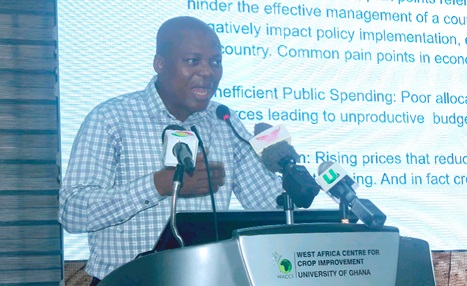
Prof. Gatsi recommends prudent debt management to address economic challenges
A Professor of Finance and Dean of the University of Cape Coast School of Business, John Gartchie Gatsi, has recommended some key measures needed to address economic challenges facing the country.
He mentioned prudent debt management, reduction in risky debt-to-GDP levels and the introduction of an independent Debt Management Office as some of the solutions.
Others are restoration of fiscal responsibility, protection of revenue and the promotion of indigenous banks.
Prof. Gatsi said as a result of the challenges, citizens were grappling with numerous economic pain points, including a housing deficit, high unemployment, corruption and weak debt management systems.
Delivering a public lecture organised by the Finance Forum at the University of Ghana last Monday, he said the country’s economic management objectives as outlined in Article 36 of the 1992 Constitution were not being met.
"The economy involves everything that happens in the country, from health, education, mining, agriculture, social protection, elections, macro-fiscal framework.
Other variables are inflation, exchange rate, revenue, expenditure and the banking sector, including monetary framework and governance, among other critical issues,” Prof. Gatsi said.
He added that Ghana's ranking as sixth in Africa's Cost of Living and Rent Index exacerbates the nation’s challenges.
Debt situation
Prof. Gatsi further said that the country's public debt stood at GH¢761.2 billion (75.7 per cent of GDP) as of July, 2024, while the gross international reserves had reduced to 0.5 months' import cover.
"The state is required to ensure that the national economy is managed to maximise the rate of economic development and also secure the maximum welfare, freedom and happiness of every citizen," he said.
Prof. Gatsi also said that the recent COVID-19 expenditure audit revealed alarming breaches of financial regulations, including single-source procurements without approval and advance payments for undelivered goods.
He, therefore, urged the government to implement the audit's recommendations.
On inflation, Prof. Gatsi said while the rate remained high, it was eroding social support such as the Livelihood Empowerment Against Poverty (LEAP) programme, adding that "inflation is detrimental to the poor and escalates multidimensional poverty levels".
He also said that the country's exchange rate volatility posed significant risks. "Exchange rate depreciation is not just about comparison between regimes, its impact on the cost structure, price development and cost of living is huge,” he explained.
To mitigate the challenges, Prof. Gatsi has advocated alternative funding sources, including Islamic bonds and diversified capital market activities.
"We must improve the independence of the Central Bank and address high non-performing loans," he said.
Voters register
Prof. Gatsi also called on the Electoral Commission (EC) and political parties to prioritise the integrity and credibility of the voters register by conducting an independent audit, citing global best practices in countries such as Kenya, Mexico, Zimbabwe, and Tunisia.
He said stakeholders must conclude on the auditing of the register now “so that the time factor is not used to blackmail the process”.
Prof. Gatsi added that independent constitutional bodies such as the EC "should not be secret societies that conduct their affairs without transparency, accountability and integrity which are good governance pillars".
"A call for audit does not take away the independence of the EC," he said.
